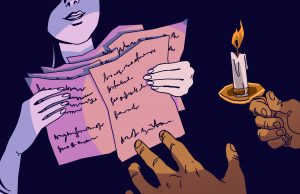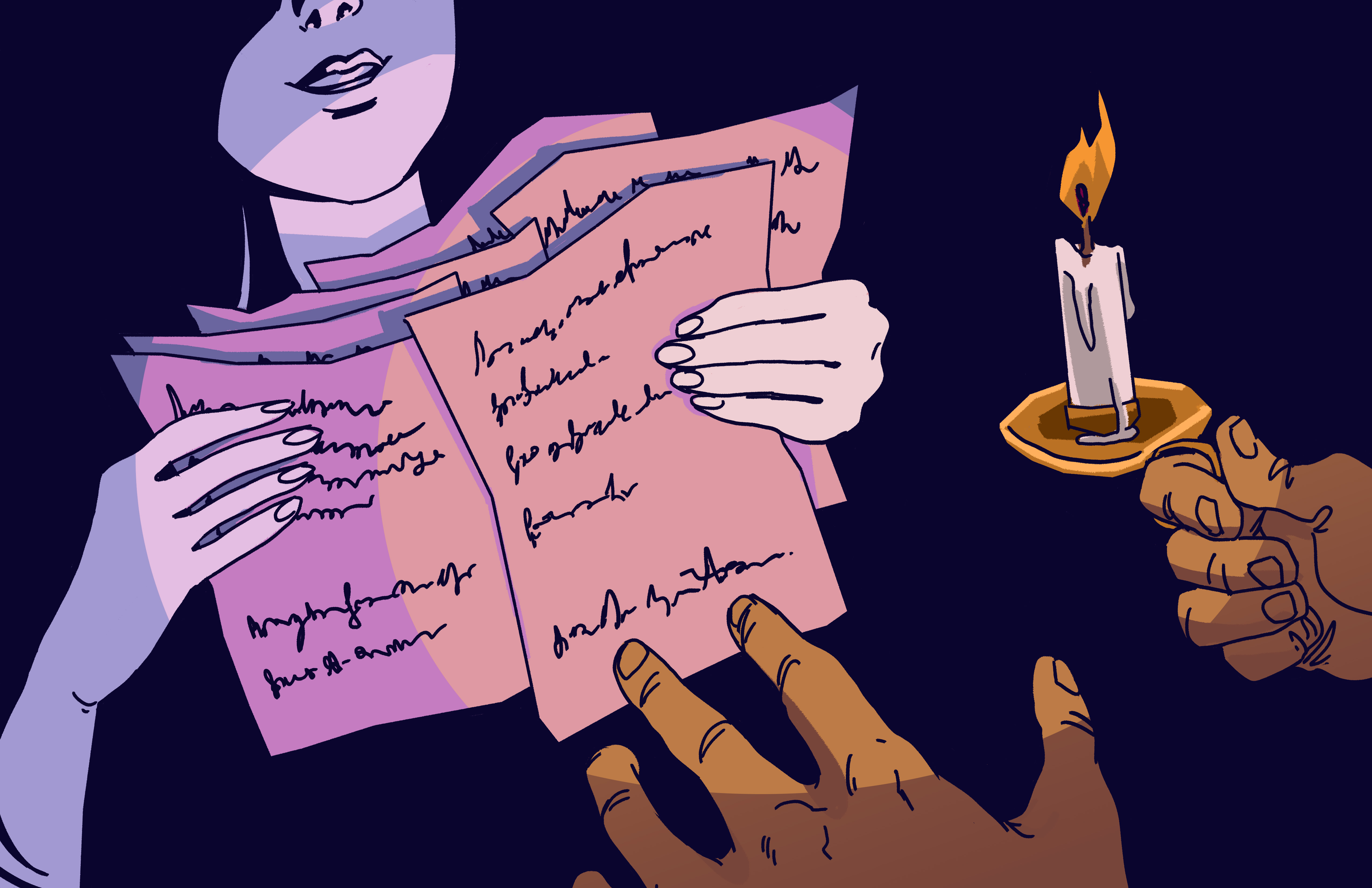An essay by Dr. Henrietta Bolingbroke, as provided by Bobby O’Rourke
Art by Errow Collins
[Excerpt from “The Madness of Giacomo Calvante” by Dr. Henrietta Bolingbroke, originally published in New Italian Literary Studies, 22 June 2015]
… intensely excited to be among the first to peruse the newly discovered diaries of poet Giacomo Calvante. These diaries may shed light not only on his poetry–the influence of which has long been underestimated–but also on a theorized mental illness and even madness which may have caused his premature death.
Calvante was born in Turin, Italy, in 1781, an obscure pioneer of free verse and a sympathizer with the Romantic movement prevalent in England at the time. Calvante’s poetry, like that of the Romantics, emphasized a break from traditional verse and an intense focus on the passions as the guiding force for humanity. Despite these sensibilities, Calvante was an outspoken proponent of technological innovation and a gifted student of chemistry and engineering; he did not revile the Industrial Revolution as many Romantics did. Consider the following lines from Calvante’s unpublished poem “Some Words on Coleridge”:
We strive
though our bodies turn to dust.
Even so
there exists a spark that lights the future.
If we must admire any part of man,
admire the will to mold a cup of iron,
which can house life forever.
An eternal mind deserves an eternal frame.
Calvante maintained a consistent output of poetry, but very few of his poems were published in his lifetime. Only two books, The Automaton (1808) and As I Look Forward (1814) were published by friends, and the first of these saw little circulation. Calvante kept hundreds of poems in his desk, either never intending for them to be seen or never considering them ready for publication. It is also known that Calvante fell into “a pervasive melancholy” shortly after his second book was published, and he spent the remaining years of his life as a recluse. He was believed to have succumbed to tubercular breathing complications: his father owned and operated a Tuscan mineral mine, which Calvante visited regularly as an adolescent.
The Collected Works of Giacomo Calvante, compiled and released in 1925, was largely ignored, scholars dismissing the poet’s influence on …
~
[From Giacomo Calvante’s diary, dated 7 December 1807]
My hand shakes as I write. I only stop now to scribble these words so if I may doubt myself in the future, I have proof of what I have done and what I have felt. Outside of these two acts, is there anything else?
My automaton is complete. She is alive. Even I, who know every crevice, and every imperfection of her, am in awe of the softness of her skin, the olivine shade of her eyes, the symmetry of her shoulders and bosom.
She is beautiful in the way gravity is constant, the way stars adhere to their natural course. She is beautiful because she will not age, will not degrade. She is beautiful because she is perfection.
Building her component parts was a long but ultimately fruitful task: my love of chemistry and construction as a small boy played no little part in her completion. Father used to allow me to peruse his bound copy of Vesalius’s On the Fabric of the Human Body, and I recall spending entire days poring over the diagrams of the human frame. Mother thought it grotesque, but then again Father claimed her books of poetry led the mind into idle wanderings. I loved when Mother would read to me each night from her selection of poetry. I knew even then that language, in a way as mechanical and efficient as any machine, was also a conduit to something deeply immersed within us, a flame that undulates with the passions and is in fact “the fire within our furnace.”
Having this dichotomy in mind, I thought of the best, most perfect way to introduce my automaton to the world. I read her poetry. And because of poetry she has awakened.
Materialists may say that she is powered by heat, which is merely a half-truth. I have made her from fire.
~
[From “The Madness of Giacomo Calvante”]
Although the dates and authenticity of the diaries have been verified, these bizarre writings beg the question: when did Calvante’s delusion of a “metal maiden” begin?
After working alongside his father at the mine in Tuscany, Calvante traveled to Milan in 1800, where he began writing his poems in earnest and fraternizing with artists and philosophers sympathetic to his aesthetics. Strangely, none of these associates make mention in any of their correspondence of Calvante’s delusions. Indeed, they seem to have been completely ignorant of it …

All that will survive of me is this automaton and the words I have passed off as my own. I thought of seeking absolution from her, telling her I am a thief of her genius.
To read the rest of this story, check out the Mad Scientist Journal: Spring 2017 collection.
Henrietta Bolingbroke is a graduate student at St. Didian’s University, closing in on her PhD in Comparative Literature with a concentration in Romantic Poetry. She is the recipient of the 2014 Madeline Chollet Memorial Poetry Prize, and her poetry has appeared in Conroy’s, Lost Ramblings Quarterly, and the Underground Review. Henrietta’s dissertation, “The Madness of Giacomo Calvante,” will complete her course of study.
Bobby O’Rourke is a native of New Jersey. He has had fiction appear in The Binnacle, Sanitarium Magazine, and The Writing Disorder, and has had poetry appear in Spires. He recently earned his MA from Fairleigh Dickinson University in Creative Writing and Literature. While formerly a teacher, he now works in higher education administration. When Bobby is not writing, he reads, sings in his car or at karaoke, and enjoys popping in a truly horrendous horror movie for laughs.
Errow is a comic artist and illustrator with a predilection towards the surreal and the familiar. She pays her time to developing worlds not quite like our own with her artist fiancee and pushing the queer agenda. She probably left a candle burning somewhere. More of her work can be found at errowcollins.wix.com/portfolio.
“Calvante’s Maiden” is © 2017 Bobby O’Rourke
Art accompanying story is © 2017 Errow Collins

A delight to read. Both language and structure are done very well!
This story was a joy to read! Thank you for sharing!
This was beautiful, heartrending, creepy, terrifying, haunting, emotive, astounding – I don’t think I can supply enough adjectives. Thank you for writing it.